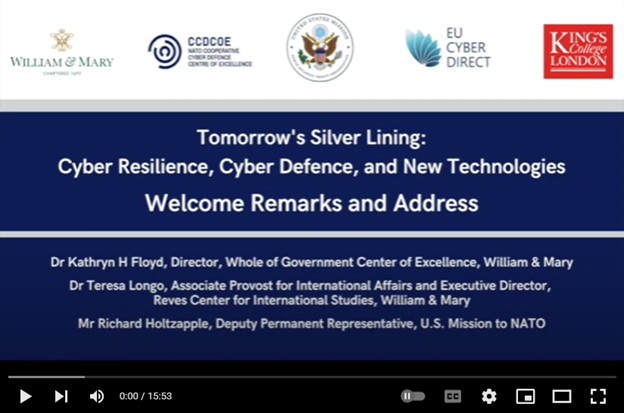Introductory and Welcome Remarks
Watch the Introductory and Welcome Remarks
Dr Kathryn H. Floyd, Director of the Whole of Government Center of Excellence at William & Mary, opened the event with a call to bring together bright and enthusiastic minds, whether 18 or 88, to dissect and tackle the good and problematic challenges in order to make NATO and European Union member nations more secure and resilient against cyber threats.
Dr Teresa Longo, Senior International Officer, William & Mary, delivered introductory remarks and issued the charge to cultivate and build resilience so that nations may prevent, absorb, or recover quickly from malicious cyber activities.
Next, Mr Richard Holtzapple, Deputy Permanent Representative and Deputy Chief of Mission of the U.S. Mission to NATO, gave the Welcome Address. Calling for fresh approaches, Mr. Holtzapple reinforced NATO’s three core tasks: deterrence and defence, crisis prevention, and management cooperative security. All of these align to ensure the key purpose: collective defence to adapt to future, and indeed present, threats. “As we face these ever present and growing threats, we must ensure we are prepared to deter such activities, defend against them, and, when necessary, respond appropriately and with unity,” shared Holtzapple. He went on to call for the modernization of the Alliance to meet these cyber challenges: “we are expediting our digital transformation to adapt the NATO command structure for the information age and to enhance our cyber defences, networks, and infrastructure.” Holtzapple then emphasized how the NATO nations are “promoting innovation and increasing our investments in emerging and disruptive technologies to retain our interoperability and military edge.” “Big data, artificial intelligence, autonomous systems, and quantum computing are changing the world and the way NATO operates,” as both sources of risks and opportunities for member nations and allies, said Holtzapple. To be ready, Holtzapple extolled the values of the public and private sectors, academia, and civil society working together to develop and adopt new technologies, establish international principles of responsible use, and maintain NATO’s technological edge, like with the Defence Innovation Accelerator for the North Atlantic (DIANA). Mr Holtzapple closed by emphasizing how NATO can prepare for and respond to hybrid activities, while looking to the future.















